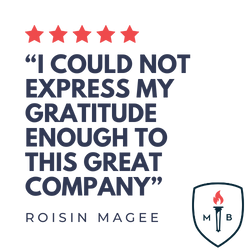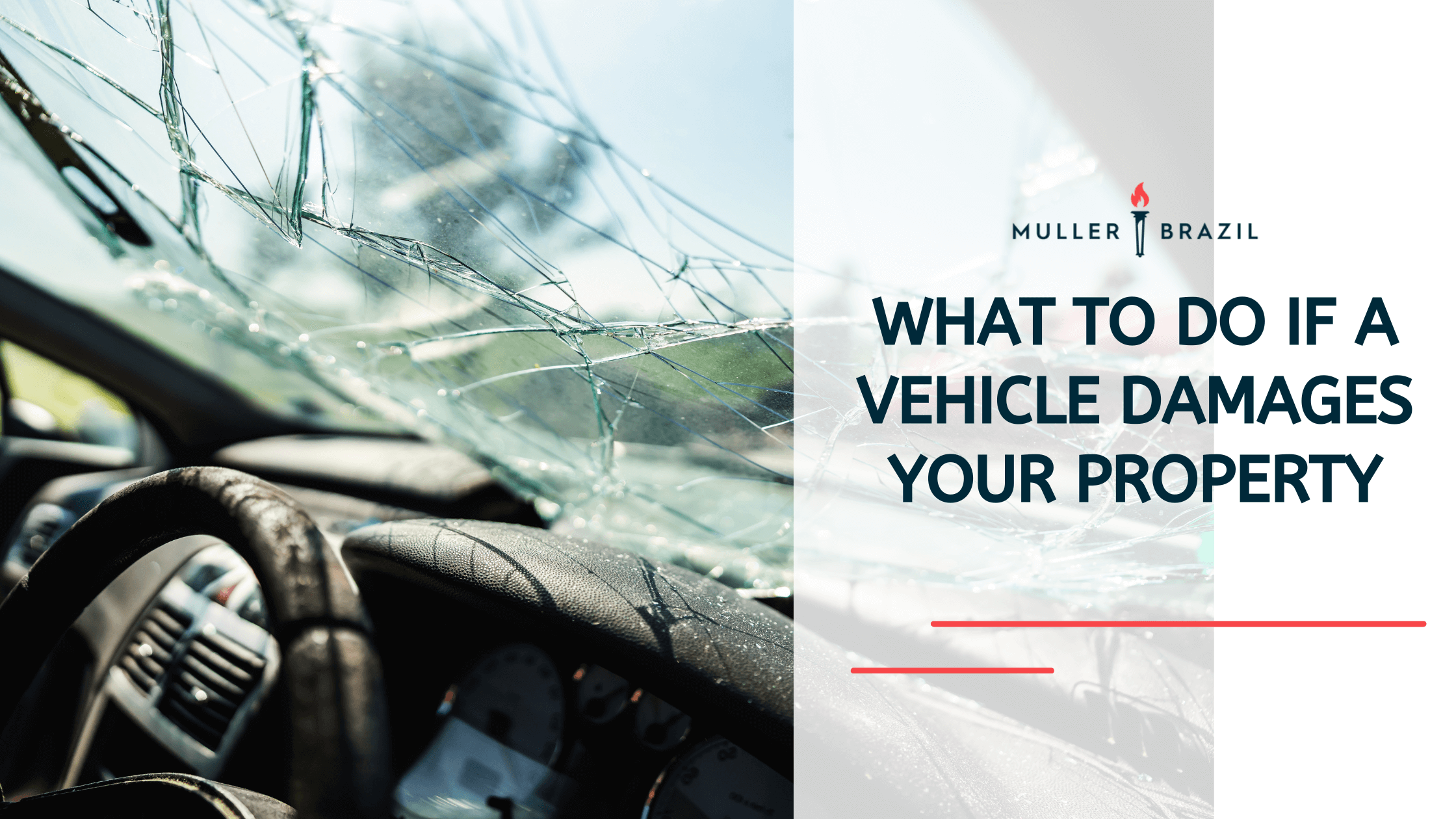6 min read
What to Do If a Vehicle Damages Your Property
![]() Paul R. Brazil, Esquire
Feb 18, 2025 9:17:00 AM
Paul R. Brazil, Esquire
Feb 18, 2025 9:17:00 AM
If a vehicle crashes into your home, fence, or parked car, you have the right to file a claim with the at-fault driver’s insurance to cover repairs. This includes documenting damage, getting a police report, negotiating with adjusters, and taking legal action if the insurer delays or denies payment.
A car crashing into your property can leave you with a collapsed fence, shattered windows, structural damage, or even a totaled vehicle—all with repair costs that can skyrocket into the thousands. A simple dented garage door can cost over $1,500 to replace, while foundation or structural repairs from a serious impact can exceed $10,000. If your parked car was hit, you could be facing a totaled vehicle, towing fees, and rental costs while waiting for repairs.
While the at-fault driver’s insurance should cover the damage, insurance companies often try to minimize payouts, dispute liability, or delay claims. Deductibles, denied claims, and lowball settlements can make getting full compensation harder than it should be.
Here’s exactly what to do—step by step—to file a claim, fight unfair insurance tactics, and make sure your repairs are covered.
What Is Property Damage and How Does It Affect You?
Property damage refers to harm caused to real or personal property, whether from a car accident, a natural disaster, or even vandalism. When a vehicle crashes into your home, parked car, or business, the financial burden can be significant.
There are three main types of property damage claims:
- Real property damage – Damage to buildings, fences, garages, or land
- Personal property damage – Harm to vehicles, electronics, furniture, or valuables
- Intangible property damage – Damage to intellectual property, like patents or copyrights
In most cases, if a driver hits your property, their property damage liability coverage should cover the cost. However, filing an insurance claim doesn’t always mean you’ll receive fair compensation. That’s why understanding your insurance policy and legal rights is critical when moving forward with repairs.
What Should You Do Immediately After the Accident?
The moments after a car crash can be chaotic, but taking the right steps can protect your rights and strengthen your insurance claim.
Secure the Scene and Ensure Safety
- Move to a safe location to prevent further injury or damage.
- If the at fault party is still present, avoid confrontations - let the police handle it.
- Call emergency services if anyone is injured or if there is significant property damage.
Gather Evidence at the Scene
- Take photos of the vehicle damages, surrounding area, and any recent repairs that were affected.
- Note the other driver’s details: name, contact info, insurance policy number, and license plate.
- Collect witness statements and their contact information.
File a Police Report
- A police report can serve as crucial evidence when dealing with an insurance company.
- Even if the driver offers to pay out of pocket, having an official record protects you.
- Get the report number and request a copy for your records.
How Do You File an Insurance Claim for Property Damage?
Once you’ve gathered evidence and filed a police report, the next step is to start the insurance claims process. Whether you’re dealing with the at fault driver’s auto insurance or your own insurer, knowing what to expect can make the process smoother.
Notify the Insurance Company
- Contact the at fault party’s insurance company as soon as possible.
- If the driver is uninsured, you may need to file a claim with your own insurance company under collision coverage or uninsured motorist property damage.
- Be ready to provide the police report, witness statements, and photos of the vehicle damages.
Work with the Insurance Adjuster
- An insurance adjuster will inspect the property damage to determine how much the insurer will pay.
- Be prepared to provide receipts for recent repairs and estimates for vehicle repairs or other damages.
- The insurance company may offer a settlement, but it’s important to guarantee that it fully covers the cost of repairs.
Negotiate if Necessary
- The first offer from an insurance company is not always the best.
- If the amount doesn’t fully cover your property damage, you have the right to negotiate.
- If your claim is delayed or denied, an attorney can help you fight for fair compensation.
What This Process Looks Like in Real Life
For example, a driver loses control and crashes into a parked car, pushing it into a garage door and damaging both. The property owner immediately files a claim with the at-fault driver’s insurance, submitting a police report, photos of the damage, and witness statements.
Here’s what happens next:
- The insurance company assigns an adjuster to inspect the damage.
- Initial repair estimates total $6,700:
- Garage door replacement: $2,500
- Vehicle bumper repair: $1,200
- Cracked siding repair: $3,000
- The insurance company offers only $4,000, arguing that the garage door had pre-existing wear and tear.
To push back, the property owner provides:
- A recent repair invoice showing the garage door was in good condition.
- Two independent repair estimates confirming actual costs.
- Photos from a recent home listing proving no prior damage.
After several follow-ups, the insurance company increases the payout to $6,500, nearly covering all repair costs.
Key Takeaways:
- Insurance adjusters often start with low offers—having repair estimates helps challenge them.
- Documenting past repairs can prevent insurers from claiming "pre-existing damage."
- Persistence leads to better outcomes—many initial settlements are increased after negotiation.
This is a common scenario in property damage claims, showing why it’s essential to be prepared and proactive when dealing with insurers.
Get Help Today
What If the Insurance Company Won’t Pay the Full Amount?
Not every insurance claim goes smoothly. The insurance company may try to minimize payouts, delay, or even deny your claim altogether. Here’s what you can do if your property damage claim isn’t being handled fairly.
Understand Why Your Claim Was Reduced or Denied
- The insurance adjuster may claim the damage existed before the car accident.
- The insurer may argue that the at fault driver isn’t fully responsible.
- Your insurance policy may not include optional forms of coverage like collision coverage.
Read more about insurance denial.
Dispute an Unfair Offer
- Provide additional evidence, such as repair estimates, witness statements, or records of recent repairs.
- Request a second opinion from an independent appraiser.
- Stay persistent - many claims are initially underpaid, but policyholders who challenge low offers often get more money.
Get Legal Help If Necessary
- A lawyer can handle negotiations with the insurance company and push for a fair settlement.
- If the at fault driver is uninsured, an attorney can explore other legal options for compensation.
- In most cases, hiring an attorney results in a better outcome than handling the claim alone.
How Can You Get Your Property Repaired or Replaced?
Once your insurance claim is approved, the next step is getting your vehicle repaired or damaged property restored. But navigating this process isn’t always straightforward. Here’s what you need to know to avoid unnecessary costs and delays.
Choosing a Repair Shop or Contractor
- You have the right to pick your own repair shop - insurance companies may recommend one, but you’re not required to use it.
- Get multiple estimates to ensure the quoted price will fully cover repairs.
- If the damage is extensive, consider consulting an independent appraiser to confirm the value of the repairs.
Handling Deductibles and Out-of-Pocket Costs
- If you’re filing through your own insurance company, you may have to pay a deductible before repairs begin.
- If the at fault driver’s insurance company is covering the damage, they should pay for repairs without requiring you to cover any costs upfront.
- If your car is declared a total loss, the insurer will issue a payout based on its value rather than funding repairs.
What If You Need a Rental Car?
- If your insurance policy includes rental car coverage, your insurer will pay for a replacement while your vehicle is being repaired.
- If the at fault party is responsible for the car accident, their insurance company should also cover a rental car for you.
- If rental costs aren’t fully covered, you may need to negotiate with the insurer or seek legal assistance.
Protecting Your Property’s Future Value
- Keep records of all repairs and receipts in case you need to file another insurance claim later.
- If the damage affects the resale value of your vehicle or property, an attorney can help you pursue compensation for diminished value.
- Make sure any work done is high quality, cutting corners on repairs now can lead to bigger issues moving forward.
How Can Muller Brazil Help with Your Property Damage Claim?
Dealing with insurance companies can be frustrating, especially when they delay, undervalue, or deny your insurance claim. At Muller Brazil, we fight for clients who deserve fair compensation for their property damage - whether it’s a vehicle, home, or business that was affected.
Why Choose Muller Brazil?
- We handle the insurance battle for you – The insurance company may try to lowball your settlement or deny liability. We push back to ensure you get what you’re owed.
- We maximize your claim – Many people accept the first offer, not realizing they could receive more money. Our team negotiates for full repair costs, rental car expenses, and any other losses.
- We offer legal guidance tailored to your case – Every property damage claim is different. We provide clear, strategic advice to help you understand your options and the best path forward.
- We take legal action if necessary – If the insurance company refuses to cooperate, we’re prepared to take them to court to fight for your rights.
What Should You Do Next?
If your car accident property damage claim is delayed, undervalued, or denied, you don’t have to handle it alone. Dealing with an insurance company after an auto accident can be frustrating, especially when they refuse to cover the full cost of repairs or dispute liability. Having a legal team on your side can make all the difference in securing the compensation you deserve.
At Muller Brazil, we advocate for clients facing unfair treatment from insurance companies. Our team understands how to negotiate with insurance adjusters, challenge lowball offers, and, if necessary, take legal action to recover full compensation for your vehicle repairs, rental car expenses, and other losses. We work on a contingency basis, meaning you don’t pay unless we win your case.
Meet the Author
Paul Brazil - Founding Partner
Paul Brazil is a native of Dunmore, Pennsylvania and a graduate of Dunmore High School. For his undergraduate education, he attended Bloomsburg University where he majored in political science. He then went on to earn his JD from Widener University School of Law. Following graduation from law school, Mr. Brazil worked at a large Philadelphia civil defense firm where he litigated workers’ compensation claims and Heart and Lung Act cases.
Learn more about Paul Brazil ⇒





